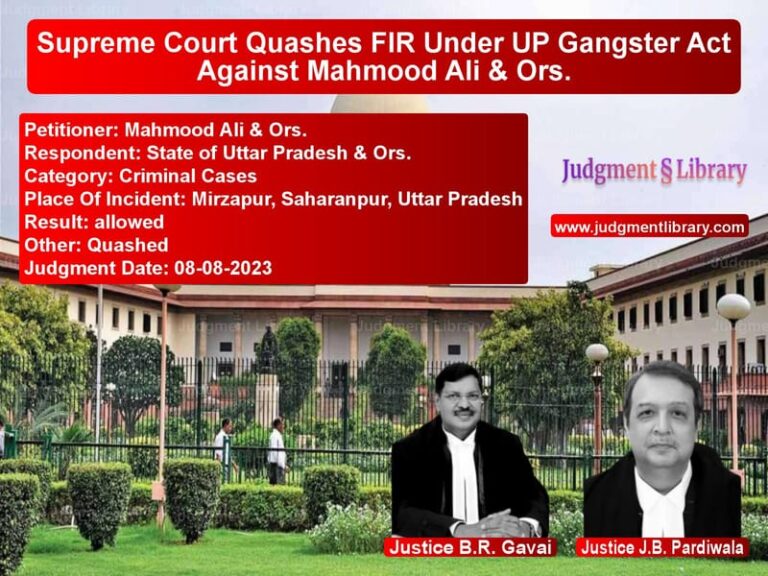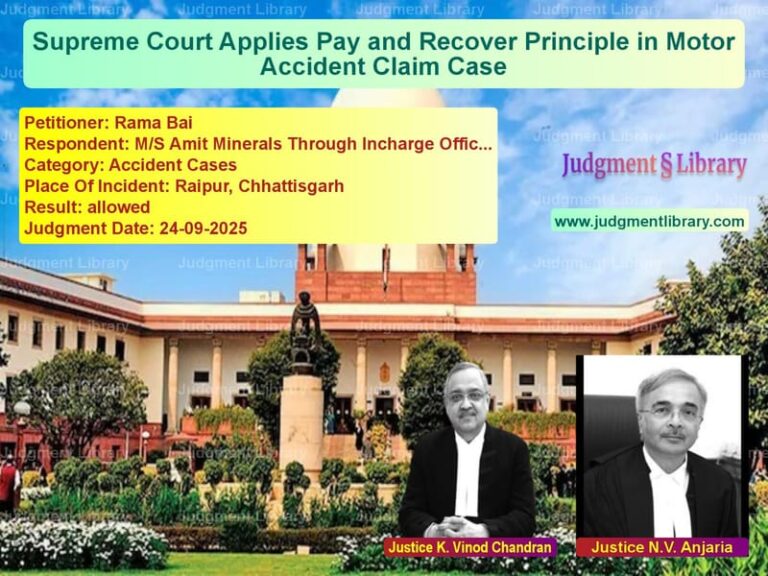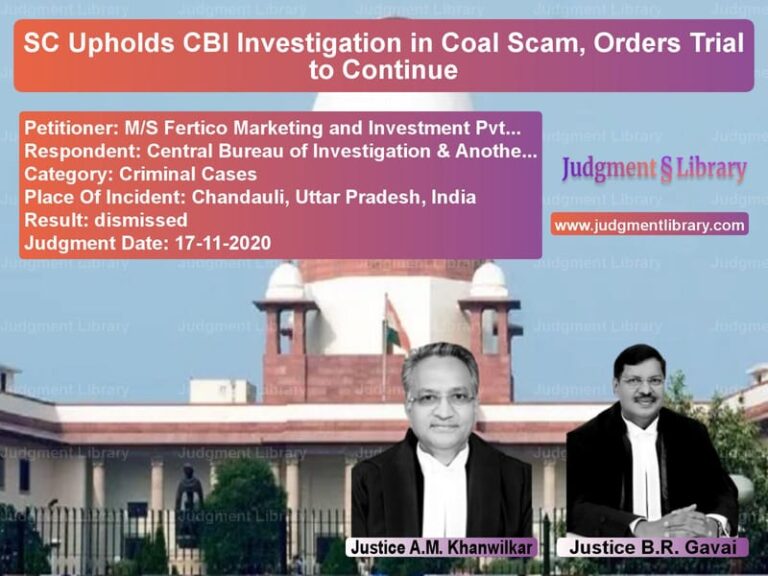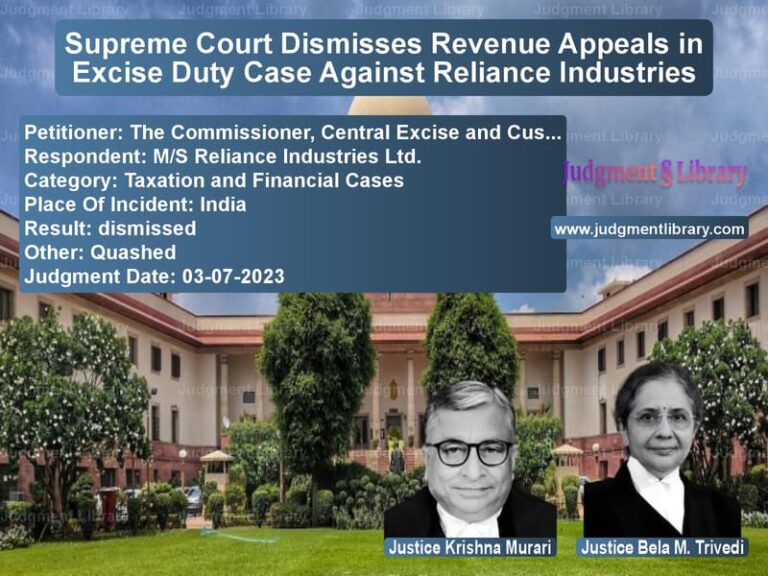Supreme Court Upholds Partition Verdict in Family Dispute Case
The case of K. Arumuga Velaiah vs. P.R. Ramasamy & Another is a landmark ruling by the Supreme Court regarding property partition disputes and the application of the principle of res judicata in civil matters. The judgment reaffirmed the finality of previous partition decrees and dismissed the appeal challenging them.
Background of the Case
The dispute revolved around the division of joint family property among the descendants of Periyaiya Servai. The plaintiff, K. Arumuga Velaiah, claimed a one-fourth share in the joint family property based on a registered will dated January 26, 1994, executed by his grandfather, Periyaiya Servai.
However, the first defendant, P.R. Ramasamy, contested the plaintiff’s claim, stating that the suit properties had already been partitioned in 1964. The partition deed, executed with the involvement of panchayatdars (arbitrators), divided the property among the three sons of Periyaiya Servai—P.R. Ramasamy, P.R. Kasilingam, and the late Marimuthu.
The plaintiff filed a suit for partition and separate possession in 2004, which was dismissed by the District Munsiff Court, Devakottai. The dismissal was upheld by the first appellate court, and later, the Madurai Bench of the Madras High Court also dismissed the second appeal in 2007. The plaintiff then approached the Supreme Court, challenging the High Court’s judgment.
Arguments of the Petitioner
The petitioner, K. Arumuga Velaiah, put forth the following arguments:
- Unlawful Denial of Share: The plaintiff contended that he was entitled to one-fourth of the joint family property under his grandfather’s will.
- Invalidity of Partition: The alleged partition in 1964 was not registered, making it legally unenforceable.
- Doctrine of Res Judicata Inapplicable: The plaintiff argued that the previous decisions did not conclusively determine his rights, as the earlier cases did not involve the validity of his claim under the will.
- Misinterpretation of Evidence: The lower courts erroneously relied on an unregistered partition deed, which was insufficient to deny him his rightful share.
Arguments of the Respondents
The respondents, led by P.R. Ramasamy, countered the petitioner’s claims with the following arguments:
- Finality of Partition: The partition of the suit properties was settled in 1964 and upheld in previous legal proceedings.
- Res Judicata Applies: The petitioner had no fresh cause of action since the ownership dispute was already decided.
- Will Cannot Override Partition: The will executed by Periyaiya Servai was invalid as he had no share in the property after the 1964 partition.
- Judicial Economy: Reopening the dispute would be an abuse of legal process, as previous rulings had established the ownership rights of the defendants.
Supreme Court’s Observations
The Supreme Court, led by Justices L. Nageswara Rao, B.R. Gavai, and B.V. Nagarathna, made the following key observations:
- Partition Validity Confirmed: The Court upheld the finding that the 1964 partition had been implemented and acted upon by all family members.
- Res Judicata Bars Fresh Suit: Since the ownership of the properties was conclusively settled in previous judgments, the petitioner could not reopen the case.
- Will is Not Legally Operative: The will executed by Periyaiya Servai was ineffective as he had no ownership rights in the suit property at the time of execution.
- Judicial Consistency: The Court emphasized that inconsistent rulings on the same matter must be avoided to maintain legal certainty.
Final Judgment
The Supreme Court dismissed the appeal, ruling:
“The appeal is accordingly dismissed. Having regard to the relationship between the parties, they shall bear their own costs.”
Implications of the Judgment
This ruling has significant implications for property law and civil litigation:
- Strengthening Res Judicata: The decision reinforces the principle that once a property dispute is conclusively settled, it cannot be reopened.
- Partition Deeds Must Be Respected: Even if not registered, a partition deed that has been acted upon and upheld by courts remains binding.
- Limiting Frivolous Litigation: The judgment discourages repeated litigation over settled matters.
- Validity of Testamentary Documents: A will cannot override prior property division if the testator no longer has ownership rights.
The Supreme Court’s ruling serves as an important precedent, ensuring stability in property disputes and emphasizing the importance of legal finality.
Petitioner Name: K. Arumuga Velaiah.Respondent Name: P.R. Ramasamy & Another.Judgment By: Justice L. Nageswara Rao, Justice B.R. Gavai, Justice B.V. Nagarathna.Place Of Incident: Madurai, Tamil Nadu.Judgment Date: 27-01-2022.
Don’t miss out on the full details! Download the complete judgment in PDF format below and gain valuable insights instantly!
Download Judgment: k.-arumuga-velaiah-vs-p.r.-ramasamy-&-anot-supreme-court-of-india-judgment-dated-27-01-2022.pdf
Directly Download Judgment: Directly download this Judgment
See all petitions in Property Disputes
See all petitions in Succession and Wills
See all petitions in Specific Performance
See all petitions in Judgment by L. Nageswara Rao
See all petitions in Judgment by B R Gavai
See all petitions in Judgment by B.V. Nagarathna
See all petitions in dismissed
See all petitions in supreme court of India judgments January 2022
See all petitions in 2022 judgments
See all posts in Civil Cases Category
See all allowed petitions in Civil Cases Category
See all Dismissed petitions in Civil Cases Category
See all partially allowed petitions in Civil Cases Category







